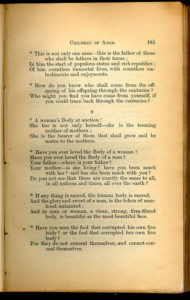
Two verses in Walt Whitman’s poem that would ultimately be titled “I Sing the Body Electric” evolved with Walt’s life, and with his parents’ lives. In the first, 1855 edition of Leaves of Grass, several verses of the poem (then untitled) read:
Have you ever loved a woman?
Your mother . . . . is she living? . . . . Have you been much with her? and has she
been much with you?
Do you not see that these are exactly the same to all in all nations and times
all over the earth?
In the 1856 edition of Leaves of Grass, the verse “Have you ever loved a woman” was altered to “Have you ever loved the body of a woman?” A gender mirroring verse was added to include “the body of a man.” In all subsequent editions, these verses would remain essentially the same, with some alteration of capitalization and punctuation. The verse, “Do you not see…”, also remained essentially the same, with some alteration of punctuation.
The verses referring to the parents were to be more mutable.
In 1856, the verse “Your father, where is your father?” was added, as if to mirror “Your mother, is she living…” Walter Whitman, Sr., had died only a few months after publication of the 1855 edition. When Walt added the verse, “Your father…”, in the 1856 edition, his father was deceased less than a year.
Have you ever loved the body of a woman?
Have you ever loved the body of a man?
Your father, where is your father?
Your mother, is she living? Have you been
much with her? and has she been much
with you?
Do you not see that these are exactly the same to all in all nations and times all
over the earth?
The 1860, 1867, and 1871 editions include both lines referring to the parents. In 1881, though, both lines vanish.
Have you ever loved the body of a woman?
Have you ever loved the body of a man?
Do you not see that these are exactly the same to all in all nations
and times all over the earth?
Between the 1871 and 1881 editions of Leaves of Grass, Walt’s mother Louisa Whitman died. Her death in May 1873 occurred only a few months after Walt himself suffered a disabling stroke that completely changed his own circumstances. Yet he described his mother’s death as far more devastating: “the great dark cloud of my life—the only staggering, staying blow & trouble I have had—but unspeakable—my physical sickness, bad as it is, is nothing to it….”
Paradoxically, Walt had added the verse “Your father” after his own father’s death. He deleted both lines concerning mother and father after his mother’s death. Maybe he simply could not bear to answer his own question: “Your mother, is she living?”

Pingback:Whitman's father & House Framing in the Mid-19th Century | JEAN HUETS